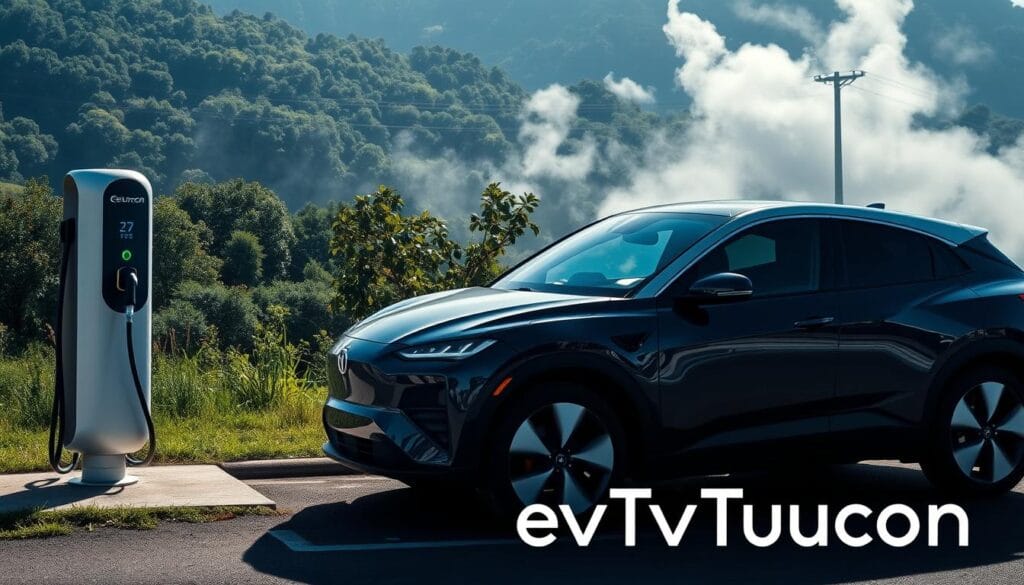Did you know that the U.S. transportation sector uses 30% of the country’s total energy and 70% of petroleum? This shows how important it is to have greener ways to travel. Electric vehicles (EVs) are a big step in this direction. They offer many benefits over traditional cars, making them a great choice for those who care about the environment and want to save money.
EVs might cost $10,000 more than gas cars1. But, they save money in the long run because they use less energy. They also cost less to own overall1. Plus, their electric motors give quick acceleration, making driving more fun than gas cars.
Electric cars are also better for the planet. They don’t release harmful pollutants like gas cars do1. This means they’re cleaner for our air and help fight climate change. It’s a big win for our planet.
Environmental Impact of Electric Vehicles
Electric vehicles (EVs) greatly benefit the environment. They help solve big problems like zero emissions and sustainable mobility2. The U.S. transportation sector uses about 30% of the country’s energy and 70% of its oil2.
Today’s EVs can go over 130 miles on a single charge, using just 25–40 kWh of electricity2.
Lower Emissions and Air Quality
EVs have no tailpipe emissions, making the air cleaner, especially in cities3. They are better for the environment than gas cars 95 percent of the time3. Gas cars emit a lot of CO2, about 8,887 grams per gallon, with an average of 25.4 mpg in 20213.
Charging EVs with clean energy like solar or wind makes them even greener3.
Reduced Noise Pollution
EVs are quiet, which means less noise pollution in cities. This makes cities quieter and more pleasant to live in.
Sustainable Energy Sources
The emissions of EVs depend on the electricity used to charge them, which changes by region2. The U.S. started exporting more petroleum in 2020, with imports of 8.32 million barrels per day in 20222. EV batteries can last 12 to 15 years in mild climates, and 8 to 12 years in harsh ones2.
The U.S. grid uses more renewables and natural gas, making EV battery production cleaner than in China3.
Electric vehicles offer many environmental benefits. They reduce emissions, improve air quality, and cut down on noise pollution. They also use sustainable energy sources. As more people choose EVs, these benefits will grow, making our future cleaner and better.
Economic Advantages of Electric Over Gasoline Cars
Electric vehicles (EVs) are becoming more popular because they save money. In September 2023, the price of a new EV dropped by $14,300 from the year before. Now, EVs cost just $2,800 more than gas cars4.
The federal EV tax credit can give buyers up to $7,500 for new EVs and $4,000 for used ones4. EV drivers also spend about 60% less on fuel each year than gas car drivers4. For example, fueling an electric car costs $485 a year, while gas cars cost $1,1174.
EVs also save on maintenance costs. They are 2.6 to 4.8 times more efficient than gas cars4. EVs cost half as much to maintain and repair as gas cars4. A 2020 study found EV owners in Washington State save up to $14,480 on fuel costs. In Hawaii, EVs might cost $2,494 more over 15 years4.
EVs are expected to save owners $7,000 to $11,000 over time compared to gas cars4. EV sales have risen to 8% of light-duty vehicle sales by May 2023, up from 2% in 20205. As battery tech and manufacturing improve, EVs will likely become even more affordable5.

In summary, EVs offer lower fuel and maintenance costs, along with tax incentives. This makes them a smart choice for saving money in the long run45.
Performance and Convenience of Electric Vehicles
Electric vehicles (EVs) give a unique driving experience, beating traditional cars in performance and ease. Their electric motors provide instant torque, making them fast off the line. Many EVs can go from 0 to 60 mph faster than sports cars6. This speed, along with a low center of gravity, makes them handle well and feel great to drive6.
EVs also win in convenience. You can charge them at home, so you always start with a full “tank.” No need to stop at gas stations all the time7. Features like pre-heating and pre-cooling the car while it’s charging make it even more comfortable7.
New EVs can go 200-300 miles on one charge, easing worries about running out of power7. With more than 53,000 public charging stations and 137,000 charging ports in the U.S. as of 20237, charging is easy. Plus, EV batteries last long, with warranties up to 8 years or 100,000 miles7.


